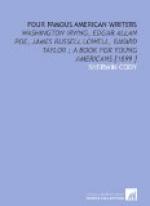“A few houses, chiefly old, stood around the bare Common, with ample elbow-room, and old women, capped and spectacled, still peered through the same windows from which they had watched Lord Percy’s artillery rumble by to Lexington, or caught a glimpse of the handsome Virginia general who had come to wield our homespun Saxon chivalry. People still lived who regretted the unhappy separation from the mother island. . . The hooks were to be seen from which swung the hammocks of Burgoyne’s captive redcoats. If memory does not deceive me, women still washed clothes in the town spring, clear as that of Bandusia. Commencement had not ceased to be the great holiday of the Puritan Commonwealth, and a fitting one it was—the festival of Santa Scholastica, whose triumphal path one may conceive strewn with leaves of spelling-books instead of bay.”
James was the youngest of four brothers and two sisters, a handsome boy, and his mother’s darling. He always thought he inherited his love of nature and poetic aspirations from her, whose family was from the Orkneys—those islands at the extreme north of Scotland.
His father was a strikingly handsome man, gracious and of rare personal qualities, and a faithful pastor over his flock. Often he took his youngest son on long drives with him, when he went to exchange pulpits with neighboring clergymen. Because of his wide family connection, and his father’s position, James saw not a little of New England society as it was in those days, pure Yankee through and through.
CHAPTER II
AN IMPETUOUS YOUNG MAN
Young James was sent first to a dame school, as a private school for very small children kept by a lady in her own house was called in those days. But when he was eight or nine he was sent to a boarding school near Elmwood—going, of course, only as a day scholar. This school was kept by an Englishman named Wells, who had belonged to a publishing firm in Boston which had failed. This teacher was very sharp and severe, but he made all his boys learn Latin, as you may see by reading the learned notes and introductions to the “Biglow Papers,” supposed to have been written by “Parson Wilbur,” but in reality by Lowell himself.
We sometimes find it difficult to believe that a great man whom we admire was ever an ordinary human being, with faults and errors like our own. But when we do find natural, childish letters, or read anecdotes of youthful naughtiness, we immediately feel like shaking hands with the scapegrace, and a real liking for him begins.
Lowell was so reserved in after life, and so very correct and elegant both in his writing and in his deportment, that when we come across two letters written at about nine years of age, badly punctuated and badly spelled, but displaying all the natural spirits of a boy, we begin at once to feel at home with him and to have a genuine affection for the man we had before only admired as a very great and learned author. Here are the two letters just as they were written. It will be a good exercise for you to rewrite them, correcting the spelling, punctuation, and other faults.




